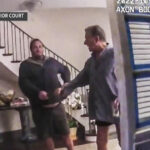Montgomery County Police Department Officer Laurie Reyes spoke to NPR about the autism and dementia unit that saves lives and helps families in Maryland.
MARY LOUISE KELLY, Host:
Family members with autism or profound dementia face unique caregiving challenges. One of them is the worry of losing a loved one. When an autistic person wanders away from their caregiver or home, the consequences can be dangerous – even fatal. Well, that did not happen to six people who eloped, as it is sometimes called, this past Tuesday in Montgomery County, Md., and thanks to a unique program with the Montgomery County Police Department. It was the idea of officer Laurie Reyes, and she joined me today.
LAURIE REYES: Hello. Welcome. Thanks for having me.
KELLY: Tell me more about what happened Tuesday in Montgomery County.
REYES: So first of all, thank you for speaking deeply about autism because autism is a spectrum. And in this case, we have many incidents of officers or communities that find individuals with autism who are at immediate risk – finding them before, in many cases, the caregivers have called 911 to report.
KELLY: What’s the mechanism? Like, how does your officer know? How do we help them get back to safety?
REYES: So first and foremost, when we train our officers, I use very few words. I say, think autism – that means you get a call for an individual who is in the middle of the road, and maybe they are stimming. The officer is going to think, wow, that might be a person with autism rather than someone who — they might be misinterpreting it because they’re under the influence. Training and experiences that lead us to have positive and safe interactions and to be reunited with loved ones.
KELLY: Hmm. Is six cases in one day in your county an unusually high number?
REYES: It is. We usually average three to eight weeks.
KELLY: And without getting into the details that might violate anybody’s privacy, I read it, and it seems like some of the cases since last Tuesday are kids — are young people wandering around, wandering into neighbors’ houses — are entering things?
REYES: Yes. Some have wandered into their neighbors’ houses. Some are found very close or at intersections or in parking lots – very dangerous locations for all.
KELLY: Yes. The program that has been created in the police department is the Autism/IDD Alzheimer’s and Dementia Outreach Unit. Tell me when, tell me how you came up with the idea.
REYES: So 2004 – so we’re actually celebrating our 20th anniversary – but the unit began to respond to these wanderings and elopements, but also to respond to crisis situations. So we want to provide training, outreach, empowerment, follow-up and response at all levels to support not just caregivers, but to support everyone on the entire autism spectrum in their journey.
KELLY: I hear the commitment in your voice. It’s quite wonderful. And I wonder if you can give me a sense of scale – what a difference that has made. Like, how many interactions do you have in a typical year, say, in Montgomery County?
REYES: So part of the core of our unit is to provide follow-up. And last year, we provided more than 600 follow-ups with families, and this year we are on track, probably, almost 1,000 follow-ups. And that follow-up tells the family, yes, we can find your child in the middle of an intersection, and we want to support you, right? We want to be there for you.
So the influence with the caregivers, individuals. You know, we go into schools and talk to people on the autism spectrum. We provide driving lessons for those who drive and have autism. So the impact is creating what we call a culture of action – not just awareness – in Montgomery County that says, we’re here for you as you navigate your level of freedom – or – your level of freedom.
KELLY: This is officer Laurie Reyes of the Montgomery County Maryland Police Department. Thank you very much.
REYES: Thank you for having me.
Copyright © 2024 NPR. All rights reserved. Visit our website’s terms of use and permission page at www.npr.org for more information.
NPR transcripts are made under fast deadlines by NPR contractors. This text may not be in its final form and may be updated or revised in the future. Accuracy and availability may vary. Official recordings of NPR programming are audio recordings.




